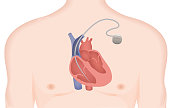Implantable Cardiac Defibrillators

Implantable Cardiac defibrillators are invasive cardiac surgery advance in cardiac care.
Health science have made amazing technological advances in cardiac surgery over the past several decades. Modern equipment, procedures, and knowledge about heart disease risk allows us to save more patient lives than ever and bring the risk of dying from a heart attack to a lower figure.
Implantable defibrillators are another innovative solution to a serious cardiac problem. These devices are implanted in the chest to control sudden problems in patients who suffer from tachycardia, or an abnormally fast heart rhythm. A fast, out-of-control heart rhythm can strike suddenly and interfere with the heart’s ability to pump blood to the entire body.
In a normally functioning human heart, the heart’s lower and upper chambers pump in sync with each other – delivering even and consistent blood flow. With heart failure brought on by tachycardia, something interferes with the electrical signals to the heart that dominate this natural rhythm and the chambers pump out of alignment.
When the heart chambers pump out of alignment, the heart is not able to deliver a adequate amount of blood to the whole body. The patient may begin to experience symptoms like dry cough, swelling of the ankles or legs, fatigue, and rapid or irregular heartbeat. Having a defibrillator implanted can greatly reduce the risk of dying of heart failure due to tachycardia.
The defibrillator consists of a tiny chip within a metal case and two “lead” wires implanted in the heart by a heart surgeon. The unit can be programmed by a doctor and is generally safe. Cell phones and MRI devices can, however, interfere with defibrillator function, so it is recommended that patients use their cell phones on the side of the head opposite that which has the defibrillator implanted. Patients with defibrillators should also not have MRI scans.
Doctors perform innovative cardiac surgeries like defibrillator implantation, minimally invasive cardiac surgery, and heart valve replacement surgery. Defibrillators represent a continuing trend of life-saving advances in cardiac care, improving quality of life for patients and their families.

Comments
Post a Comment